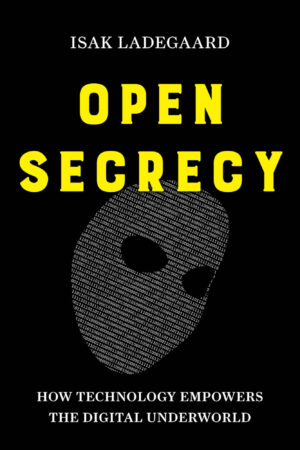Q&A with Isak Ladegaard, author of “Open Secrecy”

Open Secrecy: How Technology Empowers the Digital Underworld takes readers inside a digital economy for banned drugs, a community of activist software developers in China, and the American far right to uncover how information technology undermines state control.
Advances in information technology have made it easier for shadowy groups to organize collective action. Using military-grade encryption, rerouting software, and cryptocurrencies, they move through cyberspace like digital nomads. This book reveals how the same technology enables these groups to communicate and collaborate in public and semipublic spaces, making them both open and secret at the same time—and efforts to stop these groups provoke countermeasures with unintended, far-reaching consequences.
Isak Ladegaard is Assistant Professor of Sociology at the University of Hong Kong.
What motivated you to write Open Secrecy?
I kind of fell into it. I started writing about online drug markets, first as a journalist and later as a graduate student. Back then, this was in the early 2010s, I was surprised to see how brazen the markets were. People were openly buying and selling all kinds of illegal drugs and many of them were really excited about their newfound autonomy, which was enabled by innovative mixing of technology: mass communication tools, cryptocurrencies, and encryption.
Gradually, I realized that the bigger story here is not drug trade, but how large, shadowy groups can, with that mix of technology, work together and remain operational even as powerful law enforcement agencies do their best to shut them down. Arrests are made here and there and some platforms are terminated, but people rebuild and carry on, often in more sophisticated form. That’s a new kind of collective action that is pretty much impossible to stop with police crackdowns.
Why is this book so timely right now?
There’s a lot of talk right now about the moral ambiguities of technology, for instance whether AI will be good or bad for the world. The answer of course is that it’ll be both! My book is part of this debate. I document how publicly available tools will be used by both good and bad actors, and the state—any state—has limited ability to control the consequences. Anthony Giddens has a lovely metaphor for this: the Juggernaut. Modern development is rushing forward with great force, and the best we can do is give it a push in the right direction.
Why did you decide to frame the book around three different case studies?
Comparing three different cases helped me, and hopefully helps my readers, think more abstractly about what's going on in the data.
Open Secrecy is not about tech-savvy criminals. It’s also not about pro-social activism. It’s about how state control is undermined by new capacities for collective action. Many books focus on one of the two angles, which makes sense from a storytelling perspective, but I wanted to write a comprehensive birds-eye-view about technology and social change.

What was something that surprised you as you were researching this book?
The three cases: online drug markets in the West, anti-censorship activism in the East, and the American far-right are different, of course. But their similarities really stood out.
For example, when people migrated from one drug market to another, after a police crackdown, one person wrote: “You can’t kill an idea.” A similar defiance was on display when a Chinese developer of anti-censorship software was caught by the police, and a peer suggested that his work would continue, saying: “Ideas are bulletproof.” And, soberingly, the same sentiment surfaced when the operator of an American far-right platform responded to pressure from Big Tech by writing to his followers: “You can’t stop an idea.” These anecdotes capture a widespread spirit of “emboldened underdogness” that I saw in my research.
What insights or takeaways do you hope readers glean from your book?
Despite living in a time of mass surveillance, the state is less able to control social life than many realize. And a big part of that story is about technology.
Information technology was invented to manage societies. Writing, for example, enabled large-scale taxation, which supported the rise of the nation state. What I found is that people are now empowered in an analogous way. They use information technology to organize and maintain their own worlds, and this works even if they operate against the state. I don’t think that’s good news necessarily, I like states and sometimes joke that the Norwegian welfare state was my third parent, but I do think that’s where we are.
Learn more about Open Secrecy.